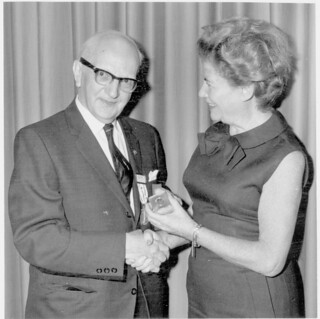
PREV ARTICLE
NEXT ARTICLE
FULL ISSUE
PREV FULL ISSUE
LET’S PLAY “WAIT, WAIT, DON’T TELL ME!”It’s time to play the popular National Public Radio game Wait, Wait, Don’t Tell Me! in this contribution from an
E-Sylum reader who lives somewhere east of Laramie, Wyoming and west of Kirkby Lonsdale, England. -Editor
Each set of three scenarios has two fictional entries and one real one. See how many you can get correct. Don’t feel bad if you do not score high, as participants in the popular NPR program usually don’t do well either. If you get as many as four right, you should consider teaching a class at the American Numismatic Association’s Summer Seminar or at least writing an article for The Asylum (the print publication of the Numismatic Bibliomania Society, that is—nothing to do with mental health, or does it?).
A: Her book, A Mint Director’s Viewpoint, gave much new information on coinage operations. B: Her monthly column in The Numismatist kept readers up-to-date on new commemoratives and other happenings during her directorship. C: In retrospect, no one knows why. She never wrote a book, the annual Mint Report was written by others, and she had no repertoire of writing except for an article on dimes. A: In 1905 President Theodore Roosevelt viewed the official inaugural medal made for him by Chief Engraver Charles E. Barber, did not like it, and commissioned a New Hampshire artist to make another, which was privately minted. B: In March 1870 when the Carson City Mint struck its first silver coins, a Proof 1870-CC dollar was made and sent to the Mint Cabinet in Philadelphia where it was on display for many years. At present it is on loan to the National Numismatic Collection at the Smithsonian Institution. C: Victor David Brenner, designer of the 1909 Lincoln cent, was born in Vienna and emigrated to the United States in 1884. He was best known for his sculptures, one of which was shown at the Jamestown Tercentenary Exposition in 1907. A: The first Liberty Head nickels minted in January 1883 lacked the word CENTS. The Treasury Department realized that a mistake had been made, and on February 21 issued a recall notice requesting that citizens turn them in to banks. Instead of doing this, most held on to them. By early 1884 they were selling for up to $2 each in the numismatic market. B: If you were living in New York City in 1852 you would find that nearly all silver coins in circulation were Spanish-American issues, fully legal tender, and Liberty Seated coins were hardly to be seen. How unusual this seemed to be! C: At the San Francisco Mint in 1923 during the production of Monroe Doctrine commemorative half dollars, 10,006 were inadvertently made from a die lacking the S mintmark. The error was caught in time by the operator of coining press No. 3, and all were saved and melted. The Numismatist, July 1927, mentioned that one somehow escaped and was displayed at a meeting of the Brooklyn Coin Club. It was later found to be an alteration with the S mintmark removed. A: Many visitors to the World’s Columbian Exposition in Chicago in 1892 purchased Columbian souvenir (as they were called) half dollars of that date. These cost $1 each and were sold at over a dozen locations on the fair grounds. B: In 1921 the state of Alabama issued commemorative half dollars to celebrate the Centennial of statehood, which actually took place in 1919. C: Liberty Seated silver dollars of 1856 are very rare today because nearly all were shipped to Bombay, India, where they were melted for their silver value. The 1915-S Panama-Pacific commemorative gold $2.50 depicts an eagle on one side and on the other: A: The figure of Liberty. Who is the handsome numismatic gent in the above photo with U.S. Mint Director Eva Adams in 1966? A. Richard S. Yeoman, founder and editor of A Guide Book of United States Coins. B. Felix O. Schlag, designer in 1938 of the Jefferson nickel. C. Vladimir Clain-Stefanelli, curator of the National Numismatic Collection at the Smithsonian Institution. We'll publish the answers next week. -Editor
 Wayne Homren, Editor The Numismatic Bibliomania Society is a non-profit organization promoting numismatic literature. See our web site at coinbooks.org. To submit items for publication in The E-Sylum, write to the Editor at this address: whomren@gmail.com To subscribe go to: https://my.binhost.com/lists/listinfo/esylum All Rights Reserved. NBS Home Page Contact the NBS webmaster 
|
